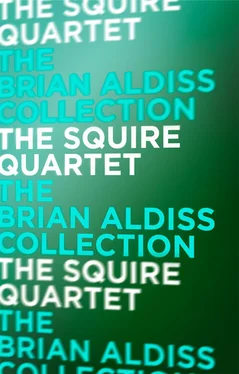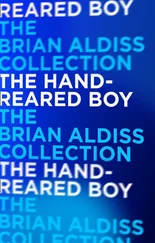Rugorsky nodded and rubbed his chin. ‘I see, Thomas. It’s because you’re not sentimental enough.’
14
An Ideological Decision
Paddington, London, September 1978
The taxi-driver talked all the way from the airport. He was eloquent on the subject of immigrants, for which he did not care. Immigrants made London dirty and refused to work. They bred like rabbits and ruined the country. Squire made little response; he did not wish to be turned out of the taxi as had happened to him once when he tried to persuade the driver that ‘the blacks’ actually contributed something to Britain’s tottering economy.
‘You look tired, squire,’ said the taxi-driver, familiarly, as he pulled up in Bouverie Square.
Cheered by being thus addressed, Squire agreed he was tired.
‘What, been abroad then?’
‘That’s it.’
‘It is tiring abroad, innit? Dunno what people go there for.’
Squire stood on the pavement. The taxi-driver reluctantly lifted his two cases out of the vehicle and set them on the pavement, while glancing up at the building suspiciously. ‘Can you manage them cases, squire? They look a bit posh for round here, don’t they? That’ll be twenty-five pounds, thanks.’
It was, if not nice, recognizable to be back in England.
As the taxi moved off in a cloud of exhaust, and Squire bent to pick up his luggage, a pudgy man, dragging a wheeled suitcase, came along the street and cried Squire’s name.
Squire responded to the man’s smile and shook his outstretched hand. The pudgy man wore a tight pair of faded jeans, a worn leather jacket, and a light blue silk sweater marked with beer or coffee stains. His long straggling grey hair surrounded a brown bald patch on the top of his head. He was perhaps sixty years old, and panted a good deal as he paused. He wiped his mouth on a blue spotted handkerchief.
‘Mustn’t stop. Just going to catch a train, but it’s lovely to see you. How’re you getting on?’
‘Fine,’ Squire said. ‘And you?’
The plump man flung his arms wide. ‘I’ve had it, really had it. Finished. The BBC didn’t get the increase it hoped for and they wouldn’t renew my contract. They’re broke, the bastards … I can’t get a job to suit me – me, of all people! The country’s going down the drain fast, it’s terrible. No room for people of talent any more.’
Suddenly the name came back to Squire. Grahame Ash, the director of ‘Frankenstein Among the Arts’, skilled, inventive, dedicated.
‘What are you going to do?’
Ash grabbed Squire’s arm. ‘Don’t laugh. I’ve accepted a job with Aussie television. They offered me something – not much. I’m on my way now, just going to say goodbye to an old friend first, then I fly to Sydney in a couple of days. Terrible, isn’t it?’
‘Very enterprising of you, Grahame. I wish you the best of luck.’
‘After all I’ve done … “Frankenstein” and all the rest of it. But the oil crisis isn’t going to go away. Inflation isn’t going to go down. I believe, if you ask me, that the Arab world is going to squeeze Europe and the US by the throat. Nothing’s ever going to be the same again. We’re going to go down the drain, till we end up like a lot of little Uruguays and Paraguays. This country’s had it, that’s my belief, I tell you frankly. We’ll have to team up with the Soviet Bloc in the end, just to keep going. Trading in furs again, before long. Well, I must dash.’ He looked at his wrist watch. Summer was closing, and the day; the light thickened in the narrow street.
‘I hope you find things better in Australia. They’ve got massive economic problems too.’
‘Don’t tell me. I’ll find out soon enough. But I’ve got a younger brother in Sydney, haven’t seen him for fifteen years. I’ll be okay. I’m talented, you know, Tom. I’ve got faith. Remember the times we had in Singapore, and Sarawak?’
‘Of course. All the best. I’d always be glad to hear from you.’
‘I’ll drop you a card. How’s Laura? See anything of her?’
‘Not lately.’
‘Lovely girl. All the best, then.’
‘All the best.’ Squire watched Ash’s departing back before taking up his cases.
The flat suited Squire well enough. He had no objection to the Paddington area. A Greek hairdresser worked at his trade in the basement of the house; sounds of clippers and bazouki music drifted up the stairs. On the ground floor was an old woman of mysterious nationality who occasionally walked a fat pug to the corner lamp post. The Iranian professor of metallurgy on the first floor was also very quiet. The young men in frilly shirts who visited him most evenings were also quiet, if not downright taciturn.
Squire rented the top floor. It was modest, and the furnishings were not even dreadful enough to be worth joking about. But the front room was large and had once been good. He found himself not displeased to be back. A sepia photograph of his parents, and a colour photograph of John, stood on the mantelpiece; otherwise the room was anonymous.
From the window, he could see the corner shop, a grocer’s run by a Pakistani family which remained open most hours of the day and night. Mr Ali Khan was the only acquaintance Squire had made in the neighbourhood; the two men now knew each other well enough for Mr Khan to confide his suspicions concerning the Chinese who ran the ‘Hong Kong Restaurant and Take-Away’, only three doors from his shop. They worked too hard and were secretive.
Having dumped his suitcases in the middle of the room, Squire went back downstairs to collect his mail, which had been thrown into an old Bovril box on the hall floor. Most of the letters were re-addressed from Pippet Hall in the firm round handwriting of Matilda Rowlinson. He had given the flat address to few people.
There was no letter from Teresa. Most of the mail looked like circulars or fan mail. He opened one letter as a kind of spot check. It came from a gentleman in Carlisle who claimed to have spent twenty years in the RAF. He had watched the ‘Frankenstein’ programme (sic) on television, and was disappointed to hear no mention of Irving Berlin, the best song-writer of this or any other century. It was time some sort of justice was done.
Squire was carrying clothes about in a rather helpless fashion, sorting out dirty items to be taken to the launderette in Praed Street, when his doorbell rang. He went to the door and dragged it open.
His brother-in-law, Marshall Kaye, stood there, bronzed, slightly ragged round the moustache, and smiling.
‘Hi, Tom, glad to find you back home. I rang your number several times. From a news item I caught, I feared the flying saucers over Ermalpa had got a hold of you.’
‘Marsh, come in.’ They shook hands. Squire indicated the muddle in his room. ‘As you can see, I’m just back. Care to sample some eight-year-old duty-free malt?’
‘Try me.’
Whilst Squire was breaking open the whisky carton, Kaye asked him about the flying saucers.
‘I saw one, Marsh. I’m convinced. I saw it, yet I still don’t believe it.’
‘Okay. It’s like seeing a damned ghost – it may scare you, but it can’t affect your life in any way. Just suppose whole squadrons of flying saucers landed, and we were up to here in little green men. It still wouldn’t affect our inner lives one bit.’
Конец ознакомительного фрагмента.
Текст предоставлен ООО «ЛитРес».
Прочитайте эту книгу целиком, купив полную легальную версию на ЛитРес.
Читать дальше












